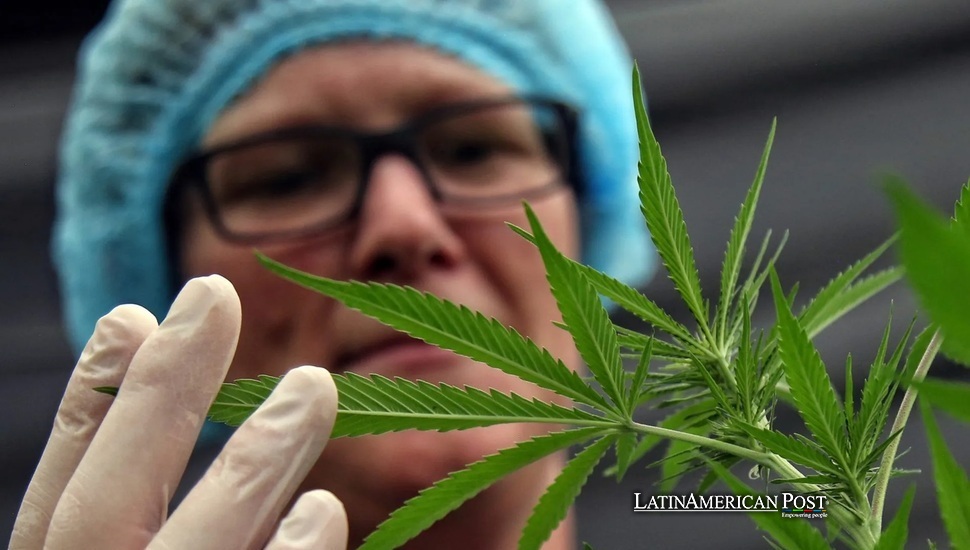Argentina Marijuana Crackdown Betrays Milei’s Libertarian Ideals

Argentina abruptly canceled permits to grow medical cannabis, casting doubt on President Javier Milei’s libertarian ideas. Although he backed personal freedom with little state control, his government quickly reversed the policy, contradicting his stated beliefs.
A Sudden Shift in Marijuana Policy
Argentina’s government recently announced that all existing permits for medical marijuana cultivation would be revoked, shaking the foundation that has been carefully constructed since 2017. Security Minister Patricia Bullrich described marijuana with higher THC levels as a “hazardous drug,” going so far as to compare it to “transgenic soybean.” She pointed to an alleged proliferation of unauthorized large-scale operations—citing one individual licensed to grow 18 plants cultivating 18,000—as evidence of regulatory breakdown.
This move to “start from scratch” effectively dismantles the Cannabis Registry Program (REPROCANN), under which individuals could legally grow medical cannabis with a doctor’s prescription, purchase cannabis from authorized pharmacies, or delegate cultivation to a third party. Pharmacy sales and allowances for the transport of up to 40 grams of cannabis were also permitted under this now-targeted system. By all indications, the new policy aims to eliminate any real or perceived loopholes, shutting down the entire licensing framework to investigate supposed abuses and illegal expansions.
On its face, some see the decision as setting tighter rules to stop wrongdoing. This change shocks me because it goes directly against President Javier Milei’s long-held libertarian views. Milei has argued that drug consumption is an individual’s choice, likening it to “euthanasia in installments,” a pointed way of suggesting that if people choose to harm themselves, the government should not intervene—nor should it pick up the tab for potential consequences. Yet the administration he leads has just greenlit a policy that imposes sweeping state control, effectively stripping legitimate medical marijuana patients and cultivators of the right to continue their activities under a previously valid legal framework.
To many observers, the gap shows that Milei’s supposed libertarian drug policy meets political challenges. Instead of sorting legal growers from those abusing the rules, officials seem to have chosen a measure that penalizes everyone. Patients who rely on medical cannabis—often to treat chronic pain, epilepsy, or other debilitating conditions—are now left in limbo as the government dissolves their permits. It remains unclear how soon or under what conditions the system might be rebuilt, if at all.
Milei’s Libertarian Rhetoric vs. Governing Reality
President Milei built much of his political identity by positioning himself as a champion of minimal state intervention. He has consistently maintained that individuals should make their own choices—and bear responsibility for the fallout of those choices—without government interference. During his campaign, he went so far as to say that if someone wants to “commit suicide” via drug use, it should be their decision, with the state remaining on the sidelines.
The sudden cancellation goes against these claims. Instead of respecting the right to choose, it shows that the government controls personal healthcare choices for long-lasting or severe conditions. Patients who joined the Cannabis Registry Program must now either turn to the black market or lose a necessary treatment. The once straightforward and regulated process to acquire medical cannabis now faces immediate jeopardy, all for the aim of fighting illegal trafficking.
Critics argue that if Milei were genuinely committed to libertarian principles, his administration would focus on punishing those who violated permit terms—like the grower who allegedly expanded from 18 plants to 18,000—without penalizing compliant patients and producers. A wholesale reset of the system suggests a more profound, fundamental reversal that veers closer to prohibitionism than a liberating, hands-off approach. Some view it as Milei succumbing to more conservative elements in his administration, especially when coupled with statements like Bullrich’s describing cannabis as dangerously potent, implicitly framing it as an acute social threat.
Argentine citizens see these policies as mixed. They saw a slow easing of marijuana rules over the past few years. Under President Alberto Fernández, Argentina made firm moves to allow medical cannabis. Legislators and policy experts created a regulatory apparatus—culminating in the formation of the National Regulatory Agency for Hemp and Medical Cannabis Industry—to ensure that the production, distribution, and consumption of medical marijuana adhered to precise standards. Now, those efforts risk unraveling. The entire industry, from small-scale home cultivators to pharmacies legally selling cannabis products, stands on uncertain ground.
For Milei’s supporters, this may be a bitter pill. Many rallied behind him precisely because they believed he would oppose stringent government meddling in private lives. While the administration says it only tackles black market activity, the policy change is enormous. It cancels legal structures thousands relied on. This weakens Milei’s reputation as a leader who values personal freedom. It also complicates the broader question of how the government plans to handle other areas of drug policy—a sphere in which Milei has often struck a more lenient tone.
Medical Cannabis in Argentina: A Gradual Evolution
To fully see the contradiction, one must review how Argentina developed its medical cannabis rules. In 2017, the government passed a law that allowed research into marijuana’s health benefits. By 2020, authorities created REPROCANN, which gave patients with proper health needs a way to grow and transport cannabis without legal penalty. Pharmacies got permission to sell some cannabis products; health insurers had to cover cannabis prescriptions. Later, in 2022, the regulatory framework broadened with the founding of the National Regulatory Agency for Hemp and Medical Cannabis Industry, intended to spur research, standardize quality, and monitor commercial development.
This slow change showed a clear move to accept and regulate, similar to global trends in countries like Canada and Germany, next to parts of the United States. Patients with conditions such as multiple sclerosis, cancer pain, or treatment-resistant epilepsy found legal routes to relief without the old marijuana stigma.
Enter the Milei administration, which, despite campaign promises to respect personal freedoms—particularly around drug use—has now endorsed a blanket revocation of permits. In practical terms, thousands of medical cannabis patients who faithfully registered with the government must brace for a stark new reality. Without a valid license, their cultivation, possession, or procurement of marijuana products could be deemed unlawful. Though the administration insists that medical cannabis itself remains legal, its abrupt push to eliminate REPROCANN leaves patients and caregivers in a precarious limbo.
Such sudden government action rarely affects only the “bad actors” in any system. Law-abiding producers, pharmacies, and cooperatives that invested time and resources into complying with regulations face the immediate risk of losing their livelihoods or being forced to operate in a gray area. Meanwhile, individuals reliant on cannabis for pain management or disease control may have to turn to illicit markets. Far from safeguarding the public, such an outcome likely jeopardizes patient safety, as unregulated cannabis products lack standardized potency and quality checks. Paradoxically, a sweeping policy meant to address alleged irregularities and criminal activities might make them more pervasive.
The Perils of Contradictory Governance
Argentina’s sudden ban on cannabis raises a bigger question: Can a politician who says he values liberty keep them once in power, especially when faced with allegations of common abuse or cheating? The Milei administration appears to have flinched at the first sign of large-scale irregularities, choosing to uproot an entire regulatory framework rather than refine it. Such a move undermines the principle that individuals—and, by extension, legitimate enterprises—should be held accountable only for their violations, not for the misdeeds of the few who exploited the system.
This change shows that Milei’s team lacks a clear plan for drug policy. Before his presidency, Milei argued that the government should do as little as possible. He repeated that people must choose for themselves, saying the state should not interfere with personal choices. His administration quickly centralized control and withdrew all legal permissions when potential abuse arose. This led to uncertainty for thousands of patients, showing that government actions harm people.
Some political commentators argue that Milei’s about-face on medical cannabis may reflect an internal struggle to please divergent constituencies. Campaigning on grandiose libertarian principles can gain traction among younger voters fed up with paternalistic governments. Governing, however, often demands alliances with more conservative powerbrokers—individuals or groups who remain hostile to liberal drug policies. Compromises can gut the original philosophy that fueled Milei’s rise, leaving behind a patchwork of contradictory measures that erode trust among supporters who believed in his promises.
This contradiction affects Argentina’s emerging cannabis sector. It has drawn investors and entrepreneurs wishing to produce medical or industrial hemp. Uncertain rules may deter these prospects, who see that a once solid licensing system can be reversed quickly. Such unpredictability might deter badly needed investment for a country striving to stimulate economic sectors beyond its traditional strongholds.
The heart of the issue, though, remains the individuals who have turned to medical cannabis as a legitimate treatment. Many have found cannabis-based therapies more effective or less fraught with side effects than conventional pharmaceuticals. They joined the government’s registry sincerely, followed the rules, and chose their health options using the law. That law quickly vanishes below them, and they fear they could lose a key support. From a libertarian view, limiting people’s ability to manage their health is unfree, especially when it happens on a large scale without clear evidence that most misused the privilege.
Milei’s view on more legalization makes the difference more significant. He has consistently stated that adults should be free to make personal decisions around drug consumption as long as they shoulder the resulting burdens. However, the measure to revoke REPROCANN effectively keeps the state front and center, dictating permissible medical choices and penalizing those who had played by the rules. If some permit holders did wrong widely, a fair solution would be to use investigations coupled with improved oversight rather than shut down the whole system. Argentina’s rollback of medical cannabis marks how a politician’s high ideals decay when faced with the complex realities of government. In an era of shifting global attitudes toward marijuana—where many countries move to refine, not abolish, medical cannabis frameworks—Argentina’s decision to revert to a near-zero baseline feels out of sync. It also doubts whether Milei’s libertarian pronouncements will hold up whenever his government faces complexity or challenge.
Also Read: Argentina Milei’s Deregulation Gains Influence Trump-Musk Economic Ideas
The real tragedy is that those who depend on medical cannabis could become collateral damage in a political scuffle that pits libertarian rhetoric against the realities of power. The new policy begs a final question: how viable is Milei’s libertarian brand if he cannot reconcile it with the regulations his administration enforces? If the government does not explain a clear plan that meets the real needs of medical cannabis patients while stopping abuses, this conflict may worsen. For now, canceling all cultivation permits shows how weak personal freedoms can be when quick political goals come before steady beliefs. And for those seeking relief through legal, medical marijuana, the principle of self-determination is no longer guaranteed—making Milei’s professed libertarianism ring hollow in a country where healthcare autonomy has abruptly hit a wall.Ak





